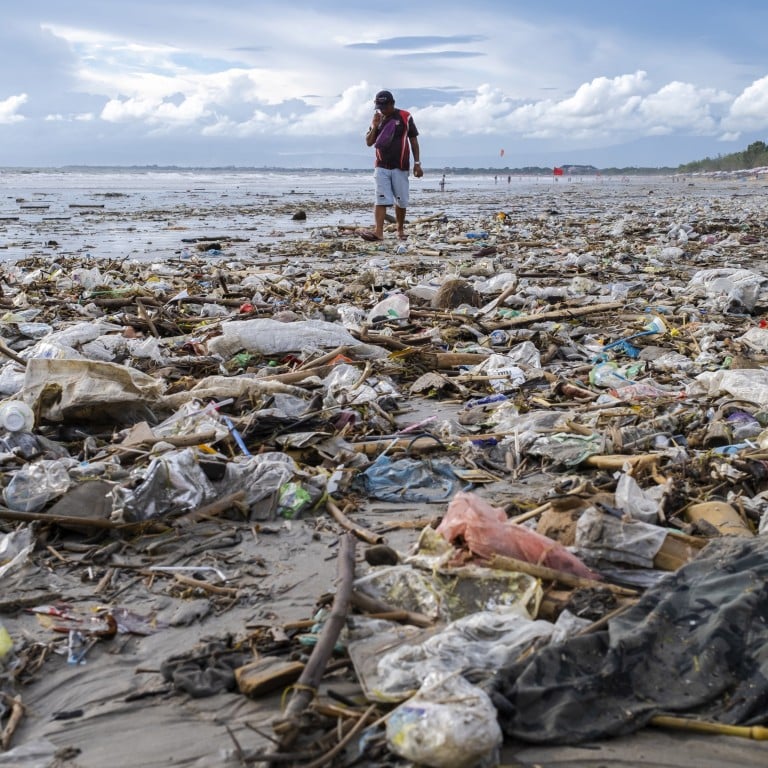
Transitioning to a circular economy can cut global plastic waste by 80 per cent by 2040: UNEP report
- The shift to a circular economy could prevent 500 million tonnes of emissions annually, saving over US$4.5 trillion in environmental and social costs up to 2040
- Some 227 million tonnes of mismanaged plastic waste could damage our health and ecosystem a year by 2040 if plastic production is left unchecked
The world could reduce plastic pollution by 80 per cent by 2040 if countries and companies implement deep policy changes and transition to a circular economy, according to a report by the United Nations Environment Programme (UNEP) on Tuesday.
The shift to a circular economy could prevent 500 million tonnes of carbon emissions annually, resulting in more than US$4.5 trillion in net savings and avoiding external costs related to health, society and the environment up to 2040, according to the report. It could also lead to a net increase of 700,000 jobs, mostly in low-income countries.
“The way we produce, use and dispose of plastics is polluting ecosystems, creating risks for human health and destabilising the climate,” Inger Andersen, the executive director at UNEP, said in a statement accompanying the agency’s report on cutting global plastic pollution.
Under a business-as-usual scenario, the world is estimated to generate 380 million tonnes of fossil-based plastics and 3.5 million tonnes of bio-based plastics a year by 2040, resulting in 227 million tonnes of mismanaged plastic waste that could damage our health and ecosystem, according to the report.
To dramatically cut plastic pollution, the report laid out a road map for adopting a circular approach to keep plastic out of the ecosystem and the economy, which can reduce the production of plastic products and generation of plastic waste by 80 per cent by 2040, while increasing the rate of recycled and secondary plastics.
This includes first eliminating problematic and unnecessary plastics to reduce the size of the problem, and achieving a circular economy through three market shifts – reuse, recycle, and reorient and diversify products.
Hong Kong start-up comes to the rescue of the world’s endangered corals
For example, by promoting reuse options, including refillable bottles, deposit-return schemes and packaging take-back schemes, the world can reduce 30 per cent of plastic pollution by 2040.
Another 20 per cent reduction can be achieved through recycling, according to UNEP. Removing fossil fuels subsidies, enforcing design guidelines to enhance recyclability and other measures would increase the share of economically recyclable plastics from 21 to 50 per cent.
Replacing plastics with products made from alternative materials such as paper or compostable materials to diversify and reorient the market can deliver an additional 17 per cent decrease in plastic pollution, according to the report.
Investment costs for the suggested systemic change are substantial, but they are less than the spending without it: US$65 billion annually as opposed to US$113 billion annually, according to UNEP. Much of this can be mobilised by shifting planned investments for new production facilities or imposing a tax on virgin plastic production to fund the circular infrastructure.
However, time is of the essence: a five-year delay may lead to an increase of 80 million tonnes of plastic pollution by 2040.
“If we follow this road map, including in negotiations on the plastic pollution deal, we can deliver major economic, social and environmental wins,” said Anderson.
The suggested solutions from the UNEP report have great significance for China, the world’s largest producer and consumer of plastics, as well as the world’s biggest carbon emitter in achieving the country’s goal to reach carbon neutrality by 2060.
Single-use plastics are made almost entirely from fossil fuels and are eventually burned, buried in landfills or discarded, leaving a large carbon footprint from production to incineration. In 2020, China produced about 60 million tonnes of plastic waste, of which about 16 million tonnes was recycled, according to the China National Resources Recycling Association.
To tackle the mounting plastic waste, Beijing has issued several policies, including a ban on all non-biodegradable plastic bags, straws and food containers, and an import ban on plastic waste from 2021. It also set a target of disposing of nearly a third of the country’s garbage through waste-to-energy plants by 2030.
On Tuesday, China’s Ministry of Commerce and the National Development and Reform Commission released a policy document to order offline retail and online commerce platforms to regularly report their use of single-use plastic products, and encourage the replacement and recycling of such products.
“From the UNEP report, we can see that reuse will have the greatest contribution on reducing plastic pollution, but it will still need a few attempts and incentive policies in this regard from domestic industries and governments,” said Zheng Xue, the executive director of advocacy group Plastic Free China.
She suggested that policymakers make investments to promote the reuse of plastics and encourage companies to develop innovative solutions.
Zheng believes by restricting the use of unnecessary plastic products and preventing plastic waste from entering the environment, China has the potential to drastically reduce plastic pollution.




